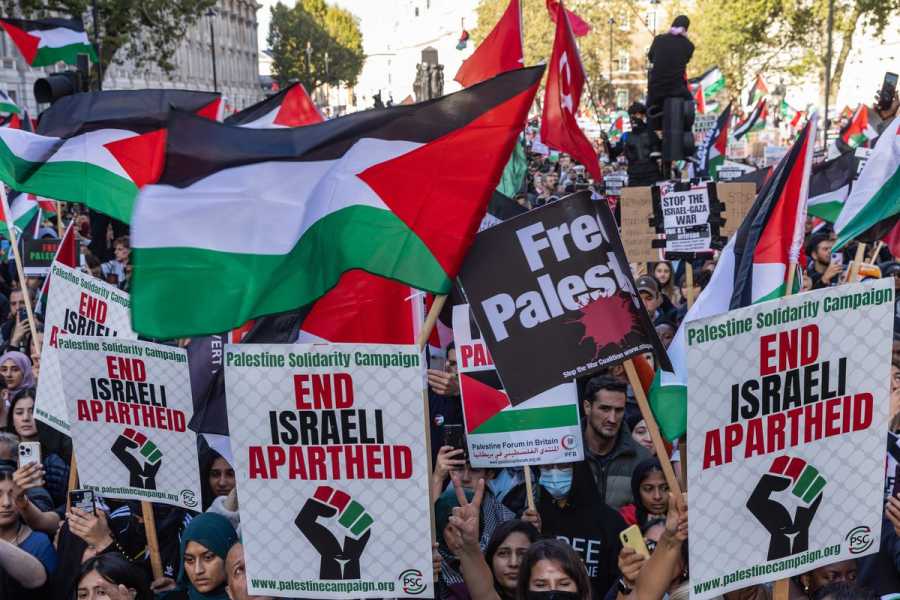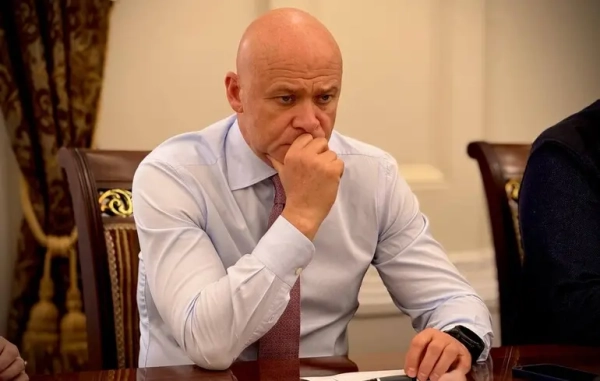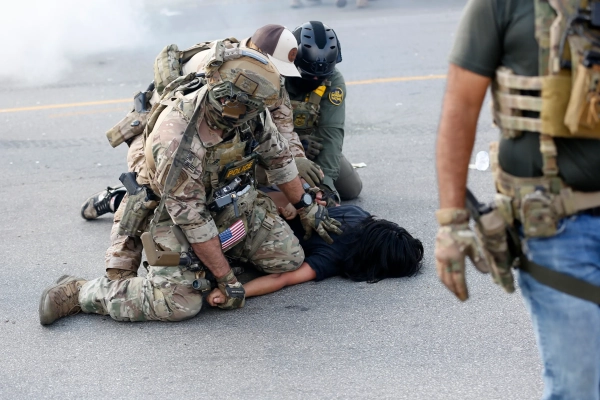Some human rights groups have reached this conclusion based on how the crime is defined in international law.

Tens of thousands of pro-Palestinian demonstrators rally outside Downing Street in support of the Palestinian population of Gaza on October 14, 2023, in London. Mark Kerrison/In Pictures/Getty Images Li Zhou is a politics reporter at Vox, where she covers Congress and elections. Previously, she was a tech policy reporter at Politico and an editorial fellow at the Atlantic.
In recent years, human rights organizations and legal experts have increasingly described Israel’s policies toward Palestinians as apartheid, adding to a longstanding debate about whether this is an accurate way to categorize the country’s practices.
Apartheid, a term originating from the South African government’s systematic oppression of Black residents, is a crime against humanity under international law. At its core, it refers to policies intended to elevate one racial group over another, with the goal of maintaining the dominant group’s hegemony. In 1998, the International Criminal Court (to which Israel is not a party) defined it as “inhumane acts … committed in the context of an institutionalized regime of systematic oppression and domination by one racial group over any other racial group … and committed with the intention of maintaining that regime.”
Human rights groups have argued that the Israeli government’s policies on land access, restrictions on movement, and limitations on the right to vote meet the ICC’s standard and that it has institutionalized racism against Palestinians in order to ensure Israeli Jews remain the dominant group across Israel and the occupied Palestinian territories (OPT), which includes the West Bank and Gaza. Israel and its allies, including the US and the European Commission, have rejected this assessment.
International organizations’ use of this term has grown in the last five years.
In 2021, Human Rights Watch (HRW) put out a report noting that the Israeli government engaged in “systematic oppression of Palestinians and inhumane acts,” which ultimately “amount to the crime of apartheid.” In 2022, Amnesty International reached a similar conclusion, saying that the Israeli state “imposes a system of oppression and domination against Palestinians” that “amounts to apartheid as prohibited in international law.” That same year, Michael Lynk, then the UN special rapporteur focused on human rights in occupied Palestinian territories, stated that the Israeli government used a “deeply discriminatory dual legal and political system,” which privileges Israeli Jewish settlers while disadvantaging Palestinian residents in these areas. (Lynk’s position was based on his review of Israeli government policies and does not reflect the position of the UN as an institution, which has a commission currently investigating this charge.)
Some Israel scholars and former Israeli officials have also started using this designation. In 2022, Michael Ben-Yair, a former attorney general of Israel, said that “it is with great sadness … I must also conclude that my country has sunk to such political and moral depths that it is now an apartheid regime.” Earlier this year, Tamir Pardo, a former head of Mossad, Israel’s intelligence agency, emphasized, too, that “there is an apartheid state here” featuring “two people [who] are judged under two legal systems.”
In protests and critiques of the Israeli government’s military actions this month, political leaders and activists around the world have often referenced the term while condemning the country’s policies.
The Israeli government, meanwhile, has argued that any claims that it practices apartheid are “preposterous and false,” antisemitic, and dedicated to singling out the country. (Human Rights Watch and Amnesty International have also condemned and examined apartheid elsewhere, including in Myanmar, where the Rohingya minority group has faced a great deal of violence.)
Israel isn’t alone in its criticism of the term, which has been the source of international debate. Those who oppose its use, including the pro-Israel civil rights group Anti-Defamation League, argue that some of Israel’s restrictive policies toward Palestinians in the occupied territories are driven by security concerns and that they don’t view these policies as motivated by racism. Some critics also claim that the term apartheid cannot be used because only Palestinian noncitizens outside of Israel’s internationally recognized borders suffer from confinement and other potentially “inhumane acts,” while Palestinian citizens of Israel purportedly have the same rights as all other Israeli citizens, such as the ability to vote and run for office.
The US and other Western allies of Israel have pushed back on this label as well. In 2023, the US House passed a resolution stating that Israel is not a “racist or apartheid state,” and in recent years, the Biden administration has said it disagreed with human rights analyses that argue that Israel practices apartheid. In January 2023, the European Commission also said that it is “not appropriate” to associate the term apartheid with the Israeli state.
Human rights experts have countered these claims, noting that Israel’s policies in both Israel and the occupied territories are discriminatory against non-Jewish residents and that actions in the West Bank and Gaza far surpass any response possibly justified by security concerns. To better understand human rights groups arguments’ regarding the term apartheid, as well as the debate around it, Vox spoke with eight human rights, policy, and legal experts, including some who supported the designation and others who did not. This reporting focused on human rights organizations because those groups have been the key drivers of conversations about Israel’s policies, and in recent years have drawn new conclusions about what they constitute.
“It’s an accurate legal designation of a situation of institutionalized discrimination and racial superiority. It is a harsh term, but this is a harsh situation,” Lynk, the former UN special rapporteur, told Vox.
Why human rights experts, including at the UN, say Israel practices apartheid
The term apartheid, which translates to “apartness” in Afrikaans, is most closely associated with policies and a legal system that segregated white and Black South Africans.
In apartheid South Africa, laws deprived Black people of access to land, the right to vote, and the ability to move freely across the country. In the last 50 years, international bodies have put forth multiple definitions of apartheid, including the UN’s 1973 International Convention on the Suppression and Punishment of the Crime of Apartheid, which was established with South Africa in mind, and the ICC’s 1998 definition, which is broader and more commonly known as the Rome Statute.
Some of the human rights analyses, like Lynk’s, have specifically focused on the Israeli government’s policies in the occupied Palestinian territories. Others, however, like Amnesty International’s, apply the term to policies in both the occupied territories and within Israel’s borders. Broadly, they argue that apartheid is upheld in the OPT by the fact that Palestinians have limited ability to move freely, have no right to vote in Israeli elections, and are tried under a completely different legal system. Many experts also point to the passage of an Israeli law in 2018 establishing Israel as the “nation state of the Jewish people,” which was seen as effectively deeming non-Jewish residents second-class citizens.
There’s a broader consensus among human rights experts that the Israeli government’s actions in the occupied territories constitute apartheid, though there isn’t as widespread consensus as to whether apartheid exists within Israel’s borders.
In the past five years, human rights experts — building on decades of research into Israel’s policies by Palestinian and Israeli groups including Al-Haq and B’Tselem — have relied on the two international legal definitions when weighing whether to designate Israel as a country that practices apartheid. To conduct their review, human rights groups and experts have used a three-part test, based on both the 1973 Convention and the Rome Statute. Their reports state that apartheid exists if:
Ultimately, Lynk at the UN — who examined the occupied territories — and HRW and Amnesty International, which looked at both the occupied territories and Israel, found that the Israeli government met all three criteria. Below were some of their findings, based on an examination of dozens of policies in the region:
1. Established an institutionalized regime of systematic racial oppression and discrimination
In the occupied territories, Israeli settlers have a completely different set of legal rights than Palestinians, says Lynk.
While Israeli settlers in the territories can vote in Israeli elections, Palestinians cannot. Israeli settlers are also able to travel freely across the occupied territories and into Israel, while Palestinians in Gaza and the West Bank cannot: They must apply for permits, which are difficult to obtain. Most Palestinians in Gaza are unable to leave the area at all, and those in the West Bank face onerous military checkpoints to travel through and out of the area. Furthermore, Israeli settlers are tried in Israeli civilian courts if accused of a crime, while Palestinians are tried in Israeli military court — which has an extremely high conviction rate and limited due process rights. And while Israeli settlers have the freedom of political speech and protest, Palestinians are governed by military orders that restrict these rights.
This binary also exists when it comes to land access and confiscation in the occupied territories, where Palestinians have seen their land seized and used for Israeli settlements and infrastructure. Additionally, Palestinian enclaves in the West Bank are walled off and isolated from one another, and certain roads are segregated for Palestinian and Israeli traffic.
Omer Bartov, an Israeli-born Holocaust historian at Brown University, said of the policies in the West Bank: “Anyone who observes the reality on the ground can have no doubt about the nature of this regime, whereby 3 million Palestinians live under one set of laws and half a million Jewish settlers live under another set of laws.”
“The rights they have are entirely determined on their nationality and their ethnicity … and then we have, of course, the situation in Gaza, where they’re entirely fenced off from the rest of the world through an elaborate blockade since 2007,” says Lynk.
Palestinian citizens of Israel have a wider set of rights than Palestinians in the occupied territories. They have the ability to vote in Israeli elections and serve in the Knesset, but they face limited opportunities to own land and build homes, along with evictions, differences in immigration policy, and implicit restrictions on social service access. Palestinian citizens face major challenges to get residential home permits approved due to zoning restrictions that limit expansion, and often risk demolition by building without them. Additionally, they’ve been the subject of evictions that human rights groups say are aimed at clearing the way for more Jewish-majority neighborhoods. The 1950 Law of Return also enables any Jewish person to move to Israel and become a citizen, while Palestinians do not have this right even if their families were previously displaced from land now within Israel’s borders.
Furthermore, Israel ties some social benefits — including financial aid for education and discounted building permits — to military service. While Jewish Israelis must serve in the military (barring exceptions for certain religious groups, like ultra-Orthodox Jewish Israelis who may apply for exemptions), Palestinian Israelis aren’t required to do so, and many don’t. Because of that, most Palestinian citizens are left with reduced access to important benefits; ultra-Orthodox Jews who are exempted from military service also have to navigate this policy, but they have access to education subsidies that Palestinian citizens are not eligible for, per HRW.
Overall, Palestinian Israelis have a more precarious political status than their Jewish counterparts because, as Amnesty International notes, Palestinian and Jewish citizens have different legal statuses: “Whilst they are granted citizenship, Palestinian citizens of Israel are denied a nationality, establishing a legal differentiation from Jewish Israelis.” This distinction matters because policies related to issues such as immigration are tied to nationality rather than citizenship.
“When it comes to poverty, housing, getting permits to build houses, to equal rights when it comes to school education, everything, we are being treated as worse than second-class citizens,” Tamar Nafar, a Palestinian with Israeli citizenship, previously told ABC News.
2. Establishing the intent to maintain the domination of one racial group over another
Those arguing that Israel practices apartheid point to the passage of a 2018 law known as the “nation-state law” as well as multiple statements that Israeli leaders have made emphasizing that they seek to prioritize the rights of Israeli Jewish residents in the region over those of other groups.
That law — which was widely criticized by Palestinians and liberal Israeli Jews as undemocratic — explicitly stated that the right to “national self-determination in the State of Israel is unique to the Jewish people.” That line underscored the reality that there was no political appetite for a one-state solution in which Palestinians and Israelis were treated equally, and its critics argued it made plain that Palestinians are second-class citizens.
Additionally, the law said that “the state views Jewish settlement as a national value and will labor to encourage and promote its establishment and development,” while downgrading Arabic from its designation as an official language. These tenets were also interpreted as legally treating Palestinian citizens different from their Jewish counterparts.
Coupled with statements by Israeli government officials, groups say the intention to maintain the dominance of one group over others is evident.
Israel is “the national state, not of all its citizens, but only of the Jewish people,” Israel’s current Prime Minister Benjamin Netanyahu said in 2019.
Outside of Israel’s borders, the Israeli government has supported what UN leaders describe as illegal settlements in the occupied territories, which have pushed Palestinians out of their communitie. According to a 2023 UN report, 700,000 Israeli settlers are living illegally in 279 settlements in the West Bank. Their influx has been linked to violence against Palestinians who live in the area and has led to the displacement of more than 1,100 Palestinians in the region in 2023 alone.
“Israeli political leaders, past and present, have repeatedly stated that they intend to retain control over all of the occupied territory in order to enlarge the blocs of land for present and future Jewish settlement while confining the Palestinians to barricaded population reserves,” Lynk writes in the UN report.
3. A series of inhumane acts that were committed as an integral part of this regime
The UN has a list of what constitutes an inhuman act, which ranges from “denial to a member or members of a racial group or groups of the right to life and liberty” to “persecution of organizations and persons … because they oppose apartheid.”
Many items on the list apply to Israel, the reports argue. Among other things, they point to the blockade of Gaza as an example of what the UN calls measures “designed to divide the population along racial lines by the creation of separate reserves and ghettos for the members of a racial group or groups.” They also note that ”the disproportionate killings and woundings of civilians by the Israeli military” is a case of the UN’s “infliction upon the members of a racial group or groups of serious bodily or mental harm,” and the limitations Palestinians face in freedom of expression and protest as an example of Israel’s “persecution of organizations and persons, by depriving them of fundamental rights and freedoms.”
Throughout the reports, Israel stands accused of repeatedly engaging in nearly every inhuman act the UN convention describes.
“The most stark thing I could say to try to illustrate this is that the poorest Israeli Jewish settlement in the West Bank enjoys more political, more economic, and more legal rights than the best and most well-off of Palestinian communities living right beside them,” says Lynk. “And that is probably the starkest and most visible example of how this huge differentiation of rights favors Israeli Jews and disadvantages Palestinian Arabs.”
Lynk’s UN report, and other recent decisions to label Israel an apartheid practitioner, follow decades of advocacy by Palestinian groups for the adoption of the term. More recently, Israeli human rights organizations including B’tselem have begun describing Israel as such. This past August, leading historians and Israel scholars, including Bartov, penned a letter criticizing the “regime of apartheid” by the Israeli government in the occupied territories.
A large part of what’s fueling the current shift in rhetoric is the belief that the Israeli government’s occupation of Palestinian territories is a long-term arrangement.
“I think the realization that a one-state reality is effectively here to stay and that there is no horizon for peace based on partition made people realize that [the] one-state reality is apartheid,” says Arab Center fellow Yousef Munayyer. Groups note, too, that by clearly demarcating these policies as apartheid and a crime against humanity, they can more accurately describe the reality of what’s taking place on the ground and urge international leaders to take sufficient action such as conditioning aid to Israel on changing its Palestine policy.
Organizations have been careful to note that they have made this conclusion using the international legal framework and are not drawing a direct comparison with the apartheid system in South Africa, which included unique policies that aren’t all present in the Israel-Palestine context, such as “petty apartheid,” referring to laws that, for example, segregated benches and water fountains. South African leaders have been outspoken, though, in the similarities between the two systems, including Archbishop Desmond Tutu, who noted, for instance, that Israel had created an “apartheid reality” and that “parallels to my own beloved South Africa are painfully stark indeed.”
The debate over the use of the term apartheid, explained
Although more and more human rights groups are now describing Israel’s policies as apartheid, there’s also been pushback from some international law experts and groups like ADL. The Biden administration, the US House of Representatives, and the European Commission have also disagreed with the use of this term.
Some of these groups point to the ICC definition to bolster their claims. Rather than focusing on “inhumane acts,” these groups stress the part of the definition that states a central feature of apartheid is “systematic oppression and domination by one racial group over any other racial group.” These groups argue that racism, and race itself, is not at the center of the Israeli government’s policies — security is — and therefore apartheid cannot exist. Additionally, they suggest that the rights Palestinian citizens have in Israel negate the idea that such policies are driven by a discriminatory rationale.
The term apartheid “often doesn’t leave space to consider the need for security considerations in policy design and implementation,” Yuval Shany, chair in public international law at Hebrew University, told Vox, arguing that travel restrictions between Israel and the West Bank criticized by many human rights groups were established due to concerns about suicide bombers.
Generally, human rights experts take issue with the idea that many of the policies Israel has imposed in the West Bank and elsewhere have a security justification. “[M]any abuses, including categorical denials of building permits, mass residency revocations or restrictions, and large-scale land confiscations, have no legitimate security justifications,” Human Rights Watch states. Additionally, they note, the need for national security can be leveraged to legitimize human rights abuses.
Others who take issue with the term apartheid note that Palestinian citizens of Israel have key rights, including the ability to serve in the Knesset, and use that fact to argue institutionalized racism doesn’t drive the country’s policies.
“Israel does not have a racial segregation implemented by law,” Haaretz opinion editor Anat Kaam wrote in the Daily Beast in October 2022. “There are Arab citizens—citizens with full, equal rights—in the Israeli parliament, the Knesset, as well as in the Israeli court system, including the Supreme Court. There are Arab doctors, professors, policemen, teachers, and countless other professions, working side by side with Jews.”
This argument was expanded upon at length by the American Center for Law and Justice’s Jay Sekulow, a Trump attorney, and Robert Ash, in a 2023 paper. They argue that the fact that Arab citizens of Israel have an opportunity of success in Israel — structural factors complicating that reality aside — undercuts the claim that the government uses race in its policies. Instead, they too claim that Israel’s policies in the occupied territories are driven by the ongoing conflict between Palestinians in these areas with the Israeli government.
Such assessments, however, fail to acknowledge the ways that Israel discriminates against Palestinian citizens inside its borders, human rights groups say. Again, Palestinians in Israel face restrictions on the land they can buy and barriers to certain social services as well as family reunification. Inside Israel, despite Palestinians comprising around 20 percent of the population, Palestinian municipalities make up just 3 percent of its land, Human Rights Watch says. And while Palestinian citizens of Israel may have more rights than Palestinians in the occupied territories, experts emphasize that the disparities they experience are undergirded by the same institutionalized racism at their core.
“If there are 7 million Israeli Jews and 7 million Palestinian Arabs under the rule of Israel, and Israel is meant to be a Jewish state, then there is no other explanation than race and ethnicity to explain the treatment of the 5.2 million Palestinians under occupation without rights and the 1.8 million Palestinian citizens of Israel with second-class rights,” says Lynk. “None of this is acceptable under any modern understanding of democracy.”
Sourse: vox.com






